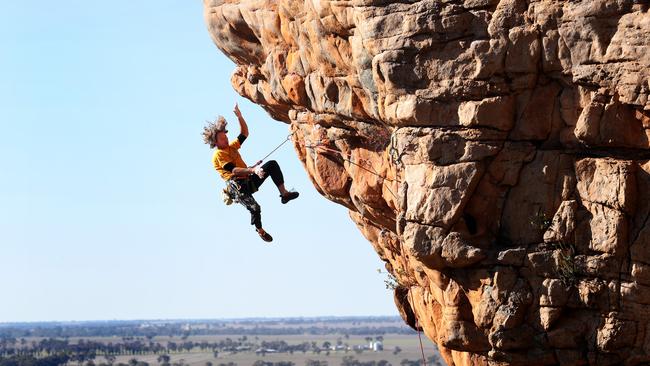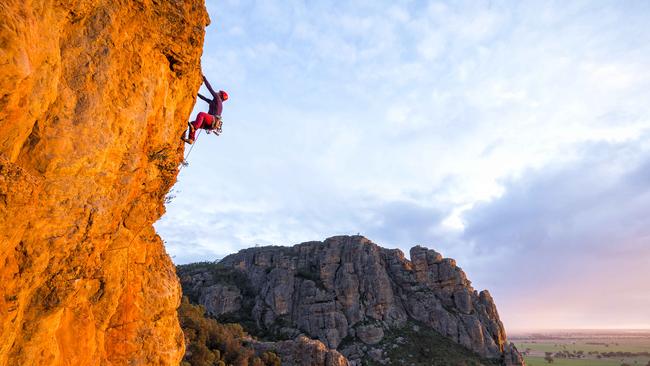Furious rock climbers set to fight bans at Mt Arapiles after heart torn out of site by Victorian Labor
The Victorian government is set to formally destroy rock climbing at Australia’s most significant site after a four-year secretive process to investigate cultural heritage.

Rock climbing at the world famous Mount Arapiles in Victoria will be gutted under Labor, with Parks Victoria citing secretive cultural heritage investigations as the driving force behind the decision.
The site is one of the world’s most significant rock climbing areas and arguably Australia’s nursery for the pursuit.
Up to half of all routes are predicted to be shut, according to climbers, some of whom are considering openly defying the bans.
The bans will shatter the local Natimuk community, diminish global visitation and lead to the closure of the iconic Pines campground that for decades has been the quirky heartland of climbing.
But the decision faces a review if the Coalition wins the state election as part of an overall rethink of cultural heritage laws in Victoria.
Opposition Indigenous affairs spokesman Peter Walsh said there needed to be a “total review” of cultural heritage laws to include potential rights of appeal.
He said this would include the use of cultural heritage laws to justify closing rock climbing areas.
The Victorian government dropped the news to climbers on the eve of the Melbourne Cup and the US elections amid a looming revolt that will test Parks Victoria’s authority and credibility.
Climbing photographer Simon Carter said: “Australia’s climbing culture is set to be destroyed. Not sure how anyone thinks this is remotely justified or will turn out well. But this is now where are.”
Climbers and environmentalists have always argued that cultural heritage should be protected, but the selectiveness of the cutbacks and the lack of accountability has fuelled anger.
“It’s a wipeout, folks. The literal beating heart of climbing in Australia has been ripped out and discarded,’’ Save Grampians Climbing reported.
Save Grampians Climbing estimates that up to half of all routes at Mount Arapiles, about 340km northwest of Melbourne, will be closed.

Mount Arapiles, also known as Dyurrite, was heavily grazed and used as a rifle range before climbers helped remediate much of the cliff-facing landscape.
Parks Victoria says the cultural heritage surveys found tens of thousands of artefacts, scarred trees and rock art.
The artefacts are likely to predominantly be stone chips.
Scar trees are ubiquitous in western Victoria, especially around lakes, rivers and swamps, but rock art is much less common. Much of the rock art is not visible to the naked eye. The survey work was done in conjunction with the local Barengi Gadjin Land Council.
Parks Victoria did not respond to The Australian’s questions on Tuesday but said in a background document that the surveys – which have not been made public – started during the pandemic.
“Between November 2020 and February 2023, Parks Victoria with the support of the Barengi Gadjin Land Council conducted archaeological and environmental surveys at Dyurrite (Mount Arapiles) and Mitre Rock in the Dyurrite Cultural Landscape (Mount ArapilesTooan State Park).
“These surveys were intended to record cultural heritage, regionally significant threatened plants and investigate the impacts of recreational activities on this rich cultural and environmental landscape. The study’s specific focus was climbing areas identified through the Crag – a global online database of climbing and bouldering areas – and the informal trail network that has been created linking climbing areas to each other and to the formal track network.
“Located on the sandstone escarpments on the eastern side of Dyurrite (Mount Arapiles) and the sandstone escarpments of Mitre Rock, the study area included 153 climbing areas and more than 35km of informal walking tracks leading to, and between, these climbing areas.”
BGLC deputy chair Lyn Mace welcomed the government’s $1.7m investment in the park. “Dyurrite is filled with irreplaceable history, artefacts and stories,’’ she said. “This funding will help us protect Dyurrite’s unique cultural heritage and ensure that Victorians can continue to visit and experience the natural and cultural significance of this landscape for generations to come.”
The issue has split climbers, with divisions over how to respond. Those who backed appeasement of the government were criticised on social media after the latest decision.



To join the conversation, please log in. Don't have an account? Register
Join the conversation, you are commenting as Logout